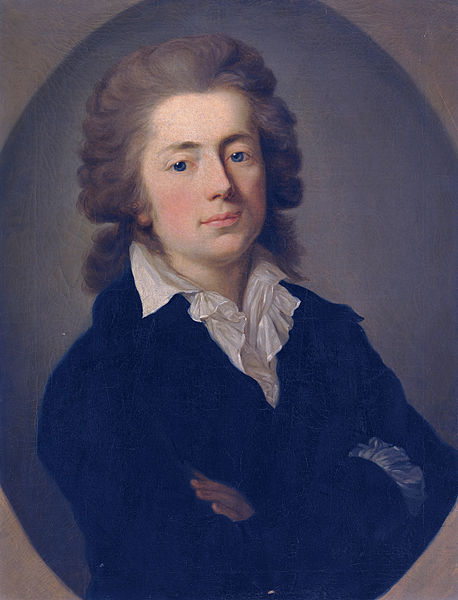Prominent Poles
Count Jan Nepomucen Potocki , Polish Army Captain of Engineers, ethnologist, Egyptologist, linguist, traveler, adventurer, outside Poland known chiefly for his novel, The Manuscript Found in Saragossa.

Born: March 8, 1761, Pikov, Podolia (Russian occupied part of Polish-Lithuanian Commonwealth, presently Ukraine)
Died: December 23(?), 1815, Uladovka near Vinnitsa (Russian occupied part of Polish-Lithuanian Commonwealth, presently Ukraine)
Early days. Count Jan Nepomucen Potocki was born into the Potocki aristocratic family (coat of arms: Pilawa). His father Jozef was an estate owner. Mother Anna Teresa Ossolinska was also from an aristocratic family. Potocki was educated in Geneva and Lausanne, Switzerland.
Career. He served twice in the Polish Army as a captain of engineers, and spent some time on a galley as novice to the Knights of Malta. His colorful life took him across Europe, Asia and North Africa, where he embroiled himself in political intrigues, flirted with secret societies and contributed to the birth of ethnology — he was one of the first to study the precursors of the Slavic peoples from a linguistic and historical standpoint. In 1790 he became the first person in Poland to fly in a hot air balloon when he made an ascent over Warsaw with the aeronaut Jean-Pierre Blanchard, an exploit that earned him great public acclaim. He spend some time in France, and upon his return to Poland, he became a known publicist, publishing newspapers and pamphlets, in which he argued for various reforms. He also established in 1788 in Warsaw a publishing house Drukarnia Wolna (Free Press) as well as the city's first free reading room. His relation with the King Stanisław II August was thorny, as Potocki, while often supportive of the King, on occasion did not shy from his critique. He was highly critical of the Russian ambassador, Otto Magnus von Stackelberg. Potocki's wealth enabled him to travel extensively, visiting Italy, Sicily, Malta, the Netherlands, Germany, France, England, Russia, Turkey, Dalmatia, The Balkans, The Caucasus, Spain, Tunisia, Morocco, Egypt, and even Mongolia. He was also one of the first travel writers of the modern era, penning lively accounts of many of his journeys, during which he also undertook extensive historical, linguistic and ethnographic studies. In 1812 he retired to his estate at Uładówka in Podolia, suffering from "melancholia" (which today would probably be diagnosed as depression). Potocki committed suicide in December 1815 at the age of 54, though the exact date is uncertain — possibly November 20, December 2 or December 11. During the last few years of his life he completed his most famous work originally written in French, The Manuscript Found in Saragossa (Manuscrit trouvé à Saragosse). He began writing it in the 1790s and completed it in 1814. It is a frame tale which he is said to have written for his own wife. On account of its rich, interlocking structure, and telescoping story sequences, the novel has drawn comparisons to such celebrated works as the Decameron and the Arabian Nights. The sixty-six stories cover a wide range of themes, subjects and styles, including gothic horror, picaresque adventures, and comic, erotic and moral tales. The stories reflect Potocki's interest in secret societies, the supernatural and oriental cultures, and they are illustrated with his detailed observations of 18th-century European manners and customs, particularly those of upper-class Spanish society. Many of the locations described in the tales are real places and regions which Potocki would have visited during his travels, while others are fictionalized accounts of actual places. While there is still some dispute about the novel's authorship, it is now generally accepted to have indeed been written by Potocki. The novel was never published in its entirety during Potocki's lifetime. A proof edition of the first ten "days" was circulated in Saint Petersburg in 1805, and a second extract was published in Paris in 1813, almost certainly with Potocki's permission. A third publication, combining both earlier extracts, was issued in 1814, but it appears that at the time of his death Potocki had not yet decided on the novel's final form. Sections of the original manuscripts were later lost, but have survived in a Polish translation that was made in 1847 by Edmund Chojecki from a complete French copy, now lost. The most recent and complete French-language version, edited by François Rosset and Dominique Triaire, was published in 2006 in Leuven, Belgium, as part of a critical scholarly edition of the Complete Works of Potocki. They identified two versions of the novel: one unfinished, of 1804, published in 1805, and the full version of 1810, which appears to have been completely re-conceived in comparison to the 1804 version. The first English-language edition, published in 1995, was a translation of Radrizzani's edition by Oxford scholar Ian Maclean. Potocki's novel became more widely known in the West via the stylish black-and-white film adaptation made in Poland in 1965 as The Saragossa Manuscript (Rekopis znaleziony w Saragossie), directed by renowned film-maker Wojciech Has.
Personal. He had two children: Alfred Wojciech and Artur, with his first spouse, Julia Lubomirska (marriage ended in divorce) and three children: Bernard, Irena and Teresa with his second spouse, Konstancja Potocka.
Honors and awards. Order of the White Eagle; Order of Saint Stanislaus; Order of St. Vladimir, 1st Class; History of Ballooning 1 - includes image of Polish stamp commemorating Potocki's flight
Modern editions of the travel memoirs. Voyages en Turquie et en Egypte, en Hollande, au Maroc (Paris: Fayard, 1980; new edition, Phébus, 1991); Voyage au Caucase et en Chine (Paris: Fayard, 1980)
This article uses, among others, material from the Wikipedia article "Jan Potocki." Text is available under the Creative Commons Attribution-ShareAlike License. :
Wikipedia
Selected other sources:
A film based on Potocki's novel
Online Polish translation of Potocki's Manuscript found...
Return to home page:
Prominent Poles
